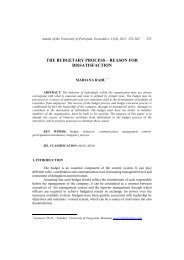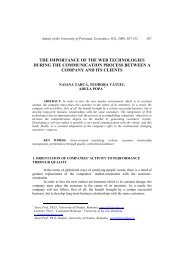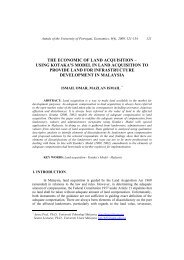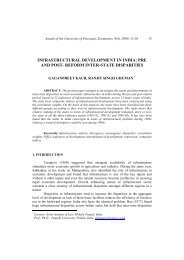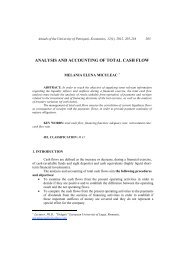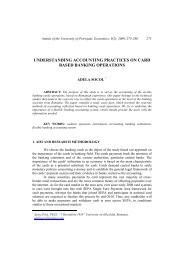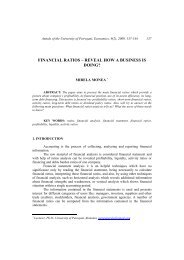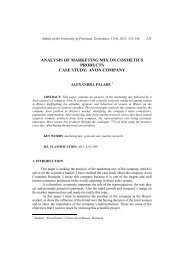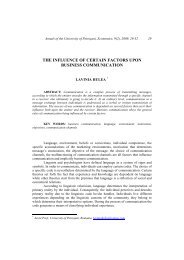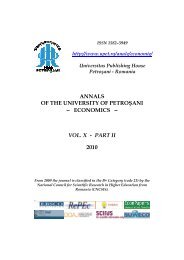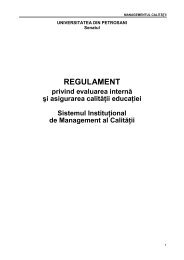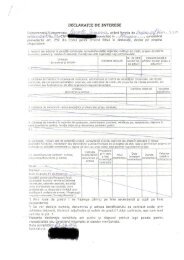annals of the university of petroÅani â¼ economics â¼ vol. xi - part i ...
annals of the university of petroÅani â¼ economics â¼ vol. xi - part i ...
annals of the university of petroÅani â¼ economics â¼ vol. xi - part i ...
You also want an ePaper? Increase the reach of your titles
YUMPU automatically turns print PDFs into web optimized ePapers that Google loves.
192 Njanike, K.; Mutengezanwa, M.; Gombarume, F.B.<br />
statements, implementing risk management policies, reviewing related <strong>part</strong>y<br />
transaction and mitigation conflict <strong>of</strong> interest and separation <strong>of</strong> duties.<br />
The research suggests that an internal control or internal audit de<strong>part</strong>ment is an<br />
essential component which ensures good corporate governance. Therefore <strong>the</strong> audit<br />
committee is necessary to ensure that <strong>the</strong> banks assets are protected and that good<br />
corporate issues are respected.<br />
On <strong>the</strong> importance <strong>of</strong> <strong>the</strong> key elements <strong>of</strong> good corporate governance <strong>the</strong><br />
findings were that all respondents suggested transparency, principle <strong>of</strong> responsibility,<br />
fairness and discipline. However, <strong>the</strong> principle <strong>of</strong> social responsibility had 85% and<br />
that <strong>of</strong> independence was mentioned by 77% <strong>of</strong> <strong>the</strong> respondents. This conclusion<br />
alludes to <strong>the</strong> assertion that good corporate governance is a function <strong>of</strong> several factors<br />
or elements.<br />
Asked on whe<strong>the</strong>r <strong>the</strong> banks had internal controls which aid in mitigating<br />
challenges associated with poor corporate governance all <strong>the</strong> respondents gave answers<br />
which can be classified broadly under <strong>the</strong> headlines <strong>of</strong> general and application control.<br />
Respondents indicated that general controls included staff loans policy, vacation<br />
policy, segregation <strong>of</strong> duties, lending control and physical control. It emerged that<br />
application controls are associated with computer packages. The findings indicate that<br />
a greater proportion <strong>of</strong> banks have come to realize <strong>the</strong> importance <strong>of</strong> internal control<br />
in banks so as to ensure good corporate governance in all operations <strong>of</strong> banks.<br />
On answering <strong>the</strong> question on how Board <strong>of</strong> Directors BOD ensures that<br />
systems <strong>of</strong> internal control continue to operate effectively and efficiently in banks <strong>the</strong><br />
following responses were obtained:<br />
Risk management reviews are made<br />
The board sets targets in place<br />
The audit committee has powers to summon members to give evidence<br />
Directors have access to <strong>the</strong> internal and external auditors<br />
The board updates and reports from executives in meetings<br />
Respondents revealed that <strong>the</strong> cause <strong>of</strong> corporate failures in Zimbabwe was<br />
due to one or more <strong>of</strong> <strong>the</strong> following factors:<br />
Overriding internal controls<br />
Fraud<br />
Disregard <strong>of</strong> prudential laws and regulations<br />
Overtrading<br />
Failure to have substantive risk management team<br />
Poor risk management practices<br />
The results also revealed that lack <strong>of</strong> adequate safeguards and checks,<br />
insufficient segregation <strong>of</strong> duties/responsibilities and internal control deficiencies lead<br />
to poor corporate governance. Respondents also identified excessive pressure on<br />
management by senior management, few independent non executive directors and inter<br />
twined board settings as weaknesses that occur in banks in Zimbabwe. The weaknesses<br />
centre on <strong>the</strong> ineffectiveness <strong>of</strong> he boards in ensuring adequate controls to ensure good<br />
corporate governance. Results from respondents points out hat futile internal controls<br />
systems are <strong>the</strong> major cause <strong>of</strong> corporate failures in <strong>the</strong> Zimbabwean banking system.



